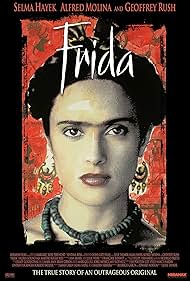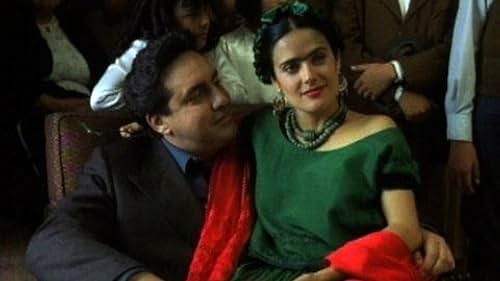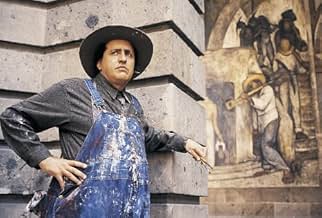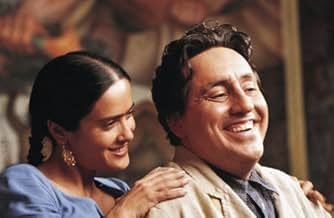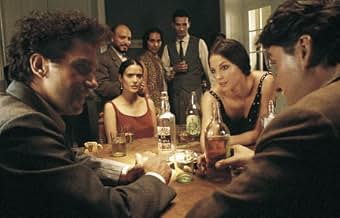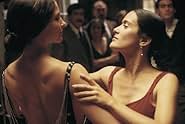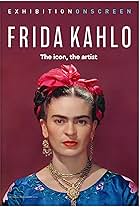A biography of artist Frida Kahlo, who channeled the pain of a crippling injury and her tempestuous marriage into her work.A biography of artist Frida Kahlo, who channeled the pain of a crippling injury and her tempestuous marriage into her work.A biography of artist Frida Kahlo, who channeled the pain of a crippling injury and her tempestuous marriage into her work.
- Won 2 Oscars
- 17 wins & 47 nominations total
Patricia Reyes Spíndola
- Matilde Kahlo
- (as Patricia Reyes Spindola)
Loló Navarro
- Nanny
- (as Lolo Navarro)
Fermín Martínez
- Painter on Bus
- (as Fermin Martinez)
Featured reviews
Salma Hayek (uni-brow and all) gives a genuinely great performance as `Frida,' the Mexican artist who is more famous, perhaps, as the wife of Diego Rivera than as a painter in her own right - although Rivera himself always insisted that it was Frida who had the greater talent.
Frida Kahlo was a woman who endured a life of crippling pain caused by a trolley accident in her youth, yet her innate energy, passion and love of life - as well as her enormous abilities as a painter - allowed her to overcome that daunting obstacle to achieve a measure of fame and recognition. What she was not quite so successful in overcoming was her strenuous love/hate relationship with Rivera, which came to occupy her time and her life almost as much as her painting. In many ways, `Frida' is a typical artist bio, highly reminiscent of other recent films in the genre such as `Pollock' and `Surviving Picasso,' both of which also dealt with the serial philandering of their male artist figures. `Frida,' however, since it is focused more intensely on the woman's perspective, offers a few new insights into that seemingly inevitable theme. Frida, in many ways, prides herself on her independent, fiery nature, yet when Rivera becomes a part of her life, she quickly succumbs to his seductive charms. She marries Rivera even though she knows he is constitutionally incapable of remaining faithful to her. Thus, she sets herself up for a life of misery with a man she is utterly incapable of living without. That the relationship is one of utter co-dependency is demonstrated by the fact that Rivera, even after their numerous breakups, keeps coming back to his one true love.
Based on the Hayden Herrera biography, the Clancy Sigal/Diane Lake/Gregory Nava/Anna Thomas screenplay doesn't paint Frida as some sort of passive victim of her own weaknesses nor as some sort of plaster saint martyr who was entirely guiltless in her own troubled life. We see, for instance, the hypocrisy inherent in her own romantic dalliances, principally her bisexual flings with other women and even the affair she conducts with none other than Trotsky himself during the period of his exile in Mexico (right before his assassination). We empathize with Frida because she functions as such a compelling figure in the context of the story, but we are never allowed to forget that she is a flawed human being, as capable of making a mess of her life as any of the men who generally occupy the lead position in these stories.
If for no other reason, `Frida' is worth seeing for the marvelous sense of history it provides, chronicling the turbulent period of the 1920's and 1930's when socialism was the `in' cause for the art world to rally around - at least until the arrival of Stalin when the pipe dream of a worker's state and a classless society fell victim to the murderous brutality of a regime more totalitarian in nature than the one it had replaced. Director Julie Taymor keeps the political issues of the era front and center, perfectly integrating them with the tumultuous relationship at the story's core. We witness, for instance, Rivera's struggle with Nelson Rockefeller when the latter commissions Rivera to paint a mural in one of his buildings. When Rockefeller, the personification of capitalism, balks at Rivera's glorification of Lenin in the painting, Rivera is forced to reexamine his own commitment to the cause he so vehemently espouses (the film makes an interesting companion piece to `The Cradle Will Rock' from a few years back). We also get to see some of the lip service paid by these artists to the socialist cause, as they live the good life among the elite pampered classes, often at the expense of the very workers whose rights they so loudly proclaim in their work.
As Frida, Hayek literally carries the film. Tender and vulnerable one moment, she can become fiery and self-confident the next. Hayak also captures much of the excruciating physical torment that Frida was forced to endure during her lifetime - and which often became the central subject of much of her art. Alfred Molina makes of Rivera a fascinatingly understated figure. His seeming world-weariness camouflages a tenderness and ability to love deeply, which, apparently, few in his life - apart from Frida - were ever able to see. Ashley Judd does a nice turn as one of Rivera's socialite devotees and Antonio Banderas makes his mark in his very brief appearance as David Siqueiros, a passionate socialist who accuses Rivera of kowtowing to the powers-that-be whom he claims to despise (Banderas is so good in the role that one regrets he isn't given more screen time). Geoffrey Rush, unfortunately, is not given enough time or good material to make much of an impression as Trotsky.
Taymor has had mixed results integrating Frida's works into the story. The director occasionally dabbles in surrealism by having Frida and Diego literally enter into the world of her paintings. Sometimes it works; sometimes it serves merely as a fancy distraction. Still, Taymor at least deserves credit for boldness in such scenes.
All in all, `Frida' provides a fascinating portrait of its heroine - and one of the best performances of the year to go along with it.
Frida Kahlo was a woman who endured a life of crippling pain caused by a trolley accident in her youth, yet her innate energy, passion and love of life - as well as her enormous abilities as a painter - allowed her to overcome that daunting obstacle to achieve a measure of fame and recognition. What she was not quite so successful in overcoming was her strenuous love/hate relationship with Rivera, which came to occupy her time and her life almost as much as her painting. In many ways, `Frida' is a typical artist bio, highly reminiscent of other recent films in the genre such as `Pollock' and `Surviving Picasso,' both of which also dealt with the serial philandering of their male artist figures. `Frida,' however, since it is focused more intensely on the woman's perspective, offers a few new insights into that seemingly inevitable theme. Frida, in many ways, prides herself on her independent, fiery nature, yet when Rivera becomes a part of her life, she quickly succumbs to his seductive charms. She marries Rivera even though she knows he is constitutionally incapable of remaining faithful to her. Thus, she sets herself up for a life of misery with a man she is utterly incapable of living without. That the relationship is one of utter co-dependency is demonstrated by the fact that Rivera, even after their numerous breakups, keeps coming back to his one true love.
Based on the Hayden Herrera biography, the Clancy Sigal/Diane Lake/Gregory Nava/Anna Thomas screenplay doesn't paint Frida as some sort of passive victim of her own weaknesses nor as some sort of plaster saint martyr who was entirely guiltless in her own troubled life. We see, for instance, the hypocrisy inherent in her own romantic dalliances, principally her bisexual flings with other women and even the affair she conducts with none other than Trotsky himself during the period of his exile in Mexico (right before his assassination). We empathize with Frida because she functions as such a compelling figure in the context of the story, but we are never allowed to forget that she is a flawed human being, as capable of making a mess of her life as any of the men who generally occupy the lead position in these stories.
If for no other reason, `Frida' is worth seeing for the marvelous sense of history it provides, chronicling the turbulent period of the 1920's and 1930's when socialism was the `in' cause for the art world to rally around - at least until the arrival of Stalin when the pipe dream of a worker's state and a classless society fell victim to the murderous brutality of a regime more totalitarian in nature than the one it had replaced. Director Julie Taymor keeps the political issues of the era front and center, perfectly integrating them with the tumultuous relationship at the story's core. We witness, for instance, Rivera's struggle with Nelson Rockefeller when the latter commissions Rivera to paint a mural in one of his buildings. When Rockefeller, the personification of capitalism, balks at Rivera's glorification of Lenin in the painting, Rivera is forced to reexamine his own commitment to the cause he so vehemently espouses (the film makes an interesting companion piece to `The Cradle Will Rock' from a few years back). We also get to see some of the lip service paid by these artists to the socialist cause, as they live the good life among the elite pampered classes, often at the expense of the very workers whose rights they so loudly proclaim in their work.
As Frida, Hayek literally carries the film. Tender and vulnerable one moment, she can become fiery and self-confident the next. Hayak also captures much of the excruciating physical torment that Frida was forced to endure during her lifetime - and which often became the central subject of much of her art. Alfred Molina makes of Rivera a fascinatingly understated figure. His seeming world-weariness camouflages a tenderness and ability to love deeply, which, apparently, few in his life - apart from Frida - were ever able to see. Ashley Judd does a nice turn as one of Rivera's socialite devotees and Antonio Banderas makes his mark in his very brief appearance as David Siqueiros, a passionate socialist who accuses Rivera of kowtowing to the powers-that-be whom he claims to despise (Banderas is so good in the role that one regrets he isn't given more screen time). Geoffrey Rush, unfortunately, is not given enough time or good material to make much of an impression as Trotsky.
Taymor has had mixed results integrating Frida's works into the story. The director occasionally dabbles in surrealism by having Frida and Diego literally enter into the world of her paintings. Sometimes it works; sometimes it serves merely as a fancy distraction. Still, Taymor at least deserves credit for boldness in such scenes.
All in all, `Frida' provides a fascinating portrait of its heroine - and one of the best performances of the year to go along with it.
Visually stunning - if this film does not win for cinematography at the Academy Awards, I will be shocked.
This film, based on the biography of Frida Kahlo by Hayden Herrera, is a masterpiece. I read the book several years ago & have been a Frida fan ever since.
I heard an interview w/Hayden on NPR not too long ago talking about her book & the movie adaptation. She did years & years of research on Frida and is probably as close to an 'expert' on her life as we could come across in the year 2003. She praised Julie Taymor for this film and was quite happy with her adaptation.
Reading the reviews on this page, i find it hard to believe that there are critics of this movie. Everything from the music (beautiful!) to the cinematography to the acting . . . greatness!! Selma really put her heart & soul into this role and she has now made her way onto my list of 'favorite actresses'.
It would be hard to put anyone's life onto the big screen & get every single detail right on - esp. someone who lived 50+ years ago. I think Julie Taymor has done an amazing job of representing the life of Frida.
This film, based on the biography of Frida Kahlo by Hayden Herrera, is a masterpiece. I read the book several years ago & have been a Frida fan ever since.
I heard an interview w/Hayden on NPR not too long ago talking about her book & the movie adaptation. She did years & years of research on Frida and is probably as close to an 'expert' on her life as we could come across in the year 2003. She praised Julie Taymor for this film and was quite happy with her adaptation.
Reading the reviews on this page, i find it hard to believe that there are critics of this movie. Everything from the music (beautiful!) to the cinematography to the acting . . . greatness!! Selma really put her heart & soul into this role and she has now made her way onto my list of 'favorite actresses'.
It would be hard to put anyone's life onto the big screen & get every single detail right on - esp. someone who lived 50+ years ago. I think Julie Taymor has done an amazing job of representing the life of Frida.
Usually, when you see a biopic about a famous artist and genius you either get to see a tragic, suffering creature or an idealized God. And often it's always the same: He/she was born, had a difficult childhood, created some masterpieces, had some affairs (usually with actors/actresses or/and musicians) and dies a sad and lonely death. But what a refreshing difference "Frida" was! Frida Kahlo's life was more suffering than joy, yet the movie does not pity her all the time but shows Frida's lust for life, love, art and her husband Diegor Riviera.
It tells the story of a really unusual life: When Frida is a student, young, beautiful, full of live and in love with a gorgeous boy (Diego Luna from "Y tu mama tambien" and "Dirty Dancing Havanna Nights) she experiences a horrible accident when her bus crashes with a tram. Frida then becomes a cripple for the rest of her life, but through this she experiences herself in a new way and starts to paint, mostly self-portraits where she deals with her pain, her family, political situations and people she loves. Soon after the accident a miracle happens: Frida learns to walk again and the first thing she does is to visit the famous artist and painter Diego Rivera to ask his opinion about her paintings the beginning of an unusual and often complicated love story that should last a lifetime.
We get to learn a woman who experiences so many tragic things in life that it should be enough to commit suicide, yet she never gives up, grows stronger and one thing that certainly helps her through hard times is her wit, her dignity and her love for life and art. She takes what she wants and needs (which also includes love affairs with men and women) but has also a lot to give. Plus her works, so honest, brutal but also beautiful in their truth, reveal one of the greatest talents of our time.
A whole lot of this movie works of course through its female protagonist, whose role is not that easy and a real challenge sometimes. The wonderful and graceful Salma Hayek, who is immensely gifted, does really great work here and awakes Frida and her world to life again. Hayek perfectly holds the balance between triumphs and losses, joy and sorrow, madness and daily routine, life and death. She is just a pleasure to watch, she doesn't play Frida, she IS Frida. Another important character is of course Diego Rivera, the greatest love of Frida's life. Alfred Molina, a great British actor, is perfectly casted for this role and besides, has a remarkable resemblance to the real Diego. Outstanding performances also by the supporting cast: Valeria Golino, Ashley Judd (with a great imitation of the Mexican accent), Geoffrey Rush and Edward Norton.
Frida a feast for the senses full of life and exploding emotions and a tribute to a truly unique and remarkable woman, who was the greatest female artist of the last century!
It tells the story of a really unusual life: When Frida is a student, young, beautiful, full of live and in love with a gorgeous boy (Diego Luna from "Y tu mama tambien" and "Dirty Dancing Havanna Nights) she experiences a horrible accident when her bus crashes with a tram. Frida then becomes a cripple for the rest of her life, but through this she experiences herself in a new way and starts to paint, mostly self-portraits where she deals with her pain, her family, political situations and people she loves. Soon after the accident a miracle happens: Frida learns to walk again and the first thing she does is to visit the famous artist and painter Diego Rivera to ask his opinion about her paintings the beginning of an unusual and often complicated love story that should last a lifetime.
We get to learn a woman who experiences so many tragic things in life that it should be enough to commit suicide, yet she never gives up, grows stronger and one thing that certainly helps her through hard times is her wit, her dignity and her love for life and art. She takes what she wants and needs (which also includes love affairs with men and women) but has also a lot to give. Plus her works, so honest, brutal but also beautiful in their truth, reveal one of the greatest talents of our time.
A whole lot of this movie works of course through its female protagonist, whose role is not that easy and a real challenge sometimes. The wonderful and graceful Salma Hayek, who is immensely gifted, does really great work here and awakes Frida and her world to life again. Hayek perfectly holds the balance between triumphs and losses, joy and sorrow, madness and daily routine, life and death. She is just a pleasure to watch, she doesn't play Frida, she IS Frida. Another important character is of course Diego Rivera, the greatest love of Frida's life. Alfred Molina, a great British actor, is perfectly casted for this role and besides, has a remarkable resemblance to the real Diego. Outstanding performances also by the supporting cast: Valeria Golino, Ashley Judd (with a great imitation of the Mexican accent), Geoffrey Rush and Edward Norton.
Frida a feast for the senses full of life and exploding emotions and a tribute to a truly unique and remarkable woman, who was the greatest female artist of the last century!
Frida is a biopic, as decadent and beautiful as the art of Frida Kahlo. I can't imagine how you could make it any other way. Yes, we follow Frida through her dysfunctional and broken relationship with both Diego Rivera and the international socialist movement. But the way this story is told is key. The editing and cinematography pays enormous tribute to Frida's paintings and the genre of art that she represents. Salma Hayek is tremendous as Frida. Alfred Molina is tremendous as Diego. It's thoroughly exquisite.
It wouldn't matter what you might show or say - people who have taken a liking to an 'artist' or their particular 'style' will defend them regardless. So it probably is with Frida Kahlo and Diago Rivera. Every country must have its acclaimed legends good or bad - the USA with Pollock and Warhol, Spain with Picasso and so it goes - it's the law of economics and superiority, etc...Oh, not to mention art....
This glossy film version of Kahlo's life and work sets out to make a hero of her and nothing will stand in its way. In the attempt to do so it pulls out all stops ~ striking visual imagery from Mexican born director of photography Rodrigo Prieto (Water For Elephants '11) ~ marvelous visual effects from Dawson and Schrecker ~ good performances from most of the cast ~ OK (if overly voyeuristic) direction from Julie Taymor ~ evocative music score by Eliot Goldenthal ~ lots of color and angst.
Maybe there wasn't a great deal to work with in Kahlo's life, as the movie spends more time indulging in over detailed examinations of her somewhat sordid private life. This may not seem so sordid if you happen to be into numerous extramarital affairs --with either sex that just happens to suit the situation-- According to the screenplay Frida divorced Rivera on grounds of his extramarital affairs - even though she knew of these right from their first meeting and he had told her many times he was incapable of any control over them. Problem was, Frida's own marital agreement was often broken in the same way but unlike Frida, Rivera (it seems) was not willing to dabble with both sexes. It's also obvious Frida had been known for her unabashed carnal indulgences as a schoolgirl - let alone an adult - in or out of marriage.
Of course fans will excuse these dalliances on the grounds of her 'artistic' temperament and physical sufferings - well, so be it. Many will regard this movie highly (especially the fans) others may feel a little left out. Good looking but maybe not a great deal more...
This glossy film version of Kahlo's life and work sets out to make a hero of her and nothing will stand in its way. In the attempt to do so it pulls out all stops ~ striking visual imagery from Mexican born director of photography Rodrigo Prieto (Water For Elephants '11) ~ marvelous visual effects from Dawson and Schrecker ~ good performances from most of the cast ~ OK (if overly voyeuristic) direction from Julie Taymor ~ evocative music score by Eliot Goldenthal ~ lots of color and angst.
Maybe there wasn't a great deal to work with in Kahlo's life, as the movie spends more time indulging in over detailed examinations of her somewhat sordid private life. This may not seem so sordid if you happen to be into numerous extramarital affairs --with either sex that just happens to suit the situation-- According to the screenplay Frida divorced Rivera on grounds of his extramarital affairs - even though she knew of these right from their first meeting and he had told her many times he was incapable of any control over them. Problem was, Frida's own marital agreement was often broken in the same way but unlike Frida, Rivera (it seems) was not willing to dabble with both sexes. It's also obvious Frida had been known for her unabashed carnal indulgences as a schoolgirl - let alone an adult - in or out of marriage.
Of course fans will excuse these dalliances on the grounds of her 'artistic' temperament and physical sufferings - well, so be it. Many will regard this movie highly (especially the fans) others may feel a little left out. Good looking but maybe not a great deal more...
Storyline
Did you know
- TriviaFrida Kahlo's niece was so impressed with the film that she gave Salma Hayek one of Kahlo's necklaces.
- GoofsEarly in her New York trip Frida is watching 1933's King Kong (1933). Later she is called home to tend to her dying mother. Several scenes later we see her at her mother's grave and it shows that she died in 1932, a year before King Kong was released.
- Quotes
Frida Kahlo: I had two big accidents in my life Diego, the trolley and you. You are by far the worse.
- ConnectionsFeatured in The 60th Annual Golden Globe Awards (2003)
- How long is Frida?Powered by Alexa
Details
- Release date
- Country of origin
- Official sites
- Languages
- Also known as
- Frida Kahlo
- Filming locations
- San Luis Potosi, San Luis Potosí, Mexico(exterior, second bus scene)
- Production companies
- See more company credits at IMDbPro
Box office
- Budget
- $12,000,000 (estimated)
- Gross US & Canada
- $25,885,000
- Opening weekend US & Canada
- $205,996
- Oct 27, 2002
- Gross worldwide
- $56,298,862
- Runtime2 hours 3 minutes
- Color
- Sound mix
- Aspect ratio
- 1.85 : 1
Contribute to this page
Suggest an edit or add missing content

